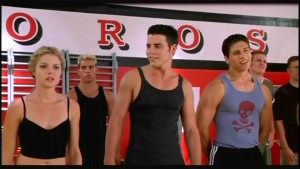I know this blog focuses a lot on gender issues with women in sports, but hey, I’m a girl. If you want to talk about men, write your own.
Which brings me to my next topic: after downing 3 cups of coffee and finishing my homework in record time at 2:00 in the morning, I was not going to sleep anytime soon. I headed off to the gym for a late-night work out and turned on ESPN2 before I hopped on the elliptical. The show Sports Nation was on, which is hosted by (a woman) Michelle Beadle and (a man) Colin Cowherd, and usually features guests: athletes, former athletes, sports commentators.
One part of the show, Michelle presents a statement made by someone in sports culture and Colin and the guest decide if the speaker should “Shut It” (that comment was unnecessary/dumb/pointless/basically they shouldn’t have said it) or “Shout It” (that comment was justified/they had a right to say it). At one point the comment in question was football-related and Michelle’s opinion differed from the guest, a former football player. The guest then went on to say, “That’s how I know you don’t know anything about football”.
“That’s how I know” meaning this woman’s statement reaffirmed your suspicion that she couldn’t possibly know anything about football? It caught me off guard—and Michelle appeared slightly uncomfortable for a moment, before she had to play it off with a quick comeback.
Do you think this guest would have made a comment like that to Colin, a fellow man? My guess is no. So why is it that men assume that women know nothing about sports? I’ve heard arguments that it’s because women try talking about sports they’ve never played/never could have played. Nice try, but if that’s the case, the man with the huge beer gut that loses his breath during his halftime waddle to the kitchen is not allowed to talk about ANY sport. There goes half of the male-sports-fan population.
In reality, I think this belief is probably so prevalent simply because women haven’t been involved in sports as long as men have. In fact, there used to be laws preventing women’s participation in sports. After the first televised sporting event, it took 35 years for a women’s event to be aired! And when television stations begin hiring female sportscasters (only because they were forced to) they were former beauty queens and cover girls—who usually didn’t actually have much knowledge of different sports; even though there were definitely knowledgeable female sports fans at the time, they weren’t openly displayed.
I think that it’s been a struggle for women to gain respect in sports because sports have been dominated by men for so long. Men assume women don’t know anything about sports because they think we’re new to the game (pun intended). But that’s an outdated view; we’re out of the kitchen, we know our stuff, and our opinions deserve just as much respect as men’s do.

